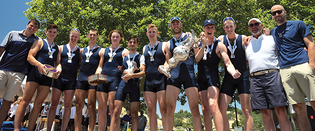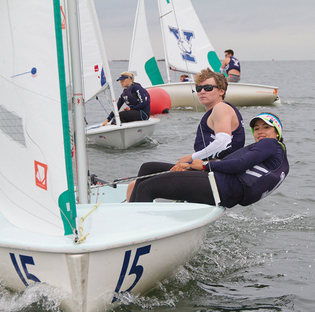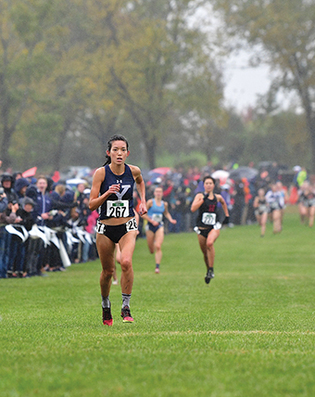 loading
loading
Sporting LifeSpring sports: victories on the waterNational championships in crew and sailing, and a trip to the finals for men's lacrosse.  Yale AthleticsThe men’s heavyweight crew celebrates another national championship. View full image Chad LyonsAlso winners of a national title: the coed sailing team, including (front to rear) Claudia Loiacano ’21, Shawn Harvey ’21, Louisa Nordstrom ’20, and Nick Hernandez ’19. View full imageSailing and CrewYale teams captured two national titles on the water at the end of the spring season—the third straight Intercollegiate Rowing Association title for men’s heavyweight crew, and a championship in team racing for coed sailing. At the IRA National Championship Regatta near Sacramento, California, the Yale varsity eight cruised to another win in eerily familiar fashion. Last July, we wrote: “Yale took an early lead in the grand final and staved off challenges from Washington and Harvard to beat the Huskies by almost three seconds.” This year, the margin was slightly more than three seconds, but the sentence—and the sense of déjà vu—otherwise stands. The decade ends with two clear dynasties: Washington won an unprecedented five straight titles from 2011 to 2015, but Yale is now the team to beat. Something new in 2019 was the fact that all three of Yale’s heavyweight boats medaled—for the first time in school history. The second-varsity boat won bronze in its field, and the third varsity won silver. There were also strong finishes for the other crews, with the women finishing eighth at the NCAA Championship and the lightweight men taking fifth at nationals. At the Yale-Harvard Regatta in New London, Yale’s heavyweight men jumped out ahead and won convincingly, beating Harvard’s boat by nearly five seconds. (It’s now been five years since the once-dominant Crimson claimed victory at New London.) Meanwhile, in Newport, Rhode Island, the coed sailing team hit the open water to dominate the LaserPerformance Team Race National Championship. Yale had already clinched the title heading into the last day of the event, tallying a 20–2 record before the final races. The following weekend, the Bulldogs placed second at the ICSA Coed Nationals, capping off a fantastic season that also included a third-place finish in the women’s national championship. At the end of the season, the accolades rolled in for a team that had made the podium in all three spring national events. Yale was awarded the Fowle Trophy for the best college sailing team, and, after two straight appearances on the All-American list, Nic Baird ’19 was named College Sailor of the Year.
Men’s LacrosseBeing a champion isn’t easy. Once you’ve won a title, you’re on the hook to defend it. For the men’s lacrosse team, which won its first-ever NCAA championship last year, the pressure was on. “It’s all people have talked about since [the tournament] ended last year,” said head coach Andy Shay at a press conference during this year’s tournament, adding an eye roll for comedic effect. In the face of great expectations, the Bulldogs nearly repeated as national title winners, finding themselves back in the final four at the NCAA championship in Philadelphia on Memorial Day weekend. This Yale team was marked by a fast-paced offense that suited this faster-paced era of college lacrosse; the NCAA had instituted an 80-second shot clock this year to try to speed up the game, and Yale rarely used much of it. In the national semifinal against Penn State, the country’s top two offenses combined to score 38 goals, with Yale jumping out to a 10–1 lead early. That lead proved to be the difference, as Yale withstood a Penn State comeback to win 21–17. The Bulldogs were boosted by the transfer of T. D. Ierlan ’20 from the University of Albany. Named Ivy Player of the Year, Ierlan led the country in ground balls in a game and face-off winning percentage: he won the ball in an astounding 76 percent of 519 faceoffs this season. In the title game, versus Virginia, possession seemed to be key against a Cavaliers team that had no qualms about using the shot clock to kill time. But while Yale dominated faceoffs and matched Virginia on ground balls, the Bulldogs found their offense stifled and scored only twice in the first half. Down 12–5 in the final quarter, Yale showed signs of life with three unanswered goals, but Virginia held on for a 13–9 win. Despite the loss, it was hard for the senior class not to reflect on the program’s achievements and fighting spirit. “A lot of times back in the day, they were huge underdogs, and they didn’t care. They would go head on into the challenge, and I knew that’s what I wanted,” said captain John Daniggellis ’19 after the game, reflecting on his recruitment. “Obviously, this year, we weren’t so much underdogs.”
 Greg CarroccioAndrea Masterson ’19 won the Ivy League cross country title, the first Yale woman to do so since 2006. View full imageWomen’s Track and FieldOn the Sunday of Commencement weekend, Andrea Masterson ’19 walked across the main stage of Old Campus to receive the Nellie Pratt Elliot Award, Yale’s top honor for a graduating female athlete. On Monday, she received her diploma. And by Thursday, she was competing in NCAA regionals in Jacksonville in her 10,000-meter specialty. “I was appreciating my last chance to wear the Y on my chest, and also trying to enjoy graduation as much I as could,” says the Seattle native. “I wanted to appreciate my last days as a Yale student and my first few days as a Yale graduate.” This demanding schedule wasn’t new for Masterson, who received numerous academic honors while competing in both the fall cross country and spring track seasons during her Yale career. Between cross country and track, Masterson qualified for NCAA regionals seven times, and this fall, she won the Ivy League Heptagonal Championship and finished first among her Yale teammates in every race. For Masterson, who plans to continue competing after graduation—with the goal of reaching next February’s Olympic marathon trials—the thrill of NCAA competition never got old. “Honestly, [the feeling] hasn’t changed at all,” says Masterson. “I get on the line and I see these All-Americans around me and it motivates me and makes me want to be right there with them.” Running was also Masterson’s path to discovering her academic passion. Being surrounded by cityscapes while training led to an interest in urban planning and an eventual major in architecture. “I’m thinking about the way I move through cities constantly,” she explains. “As a runner, you see way more of a city.” Her thesis was a “social-historical” perspective on the history of Western public parks. “I traced the definition of a public park from ancient Rome through Seattle,” she says. “It was inspired by my love of running and public spaces.” When Masterson isn’t competing, perhaps she’ll be designing public spaces that inspire a new generation of champions.
The comment period has expired.
|
|